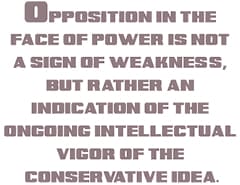Contrarians must push back against nativist authoritarianism and return to conservative principles
Excerpted from “How the Right Lost Its Mind”
Copyright © 2017 by the author and reprinted by permission of St. Martin’s Press
The day in late March (2016) when Trump called in to my radio show, I had posted an article giving him fair warning: “Donald Trump is about to find out that Wisconsin is different. And one of the reasons is conservative talk radio.” Along with five other conservative talk show hosts in the state, I had been critical of Trump for months, and it had taken its toll on the front-runner’s popularity. Polls showed that in the vote-rich WOW counties around Milwaukee — Waukesha, Ozaukee, Washington — Trump was viewed positively by only 25 percent of GOP voters; 64 percent said they disapproved of the Manhattan billionaire. In other words, when Trump was subjected to a sustained critique, conservative voters responded. But in 2016, Wisconsin’s media culture was the exception to the trend in the Right media’s ecosystem.
Wisconsin was also an outlier for a number of other reasons, including its Midwestern sensibilities and a culture that valued certain norms of civility (although the concept of “Wisconsin nice” may have been overplayed). Conservative voters there had been exposed to substantive, reform-minded conservatives like Paul Ryan for years, and had been battle-tested by recent political fights, including the high-profile attempt to recall Gov. Scott Walker.
A few weeks before the primary, I tried to explain what made Wisconsin different. “There’s kind of a fundamental decency about Wisconsinites that you can’t downplay,” I told The Washington Post’s Dave Weigel. “We’ve never had a huge division between the Tea Party and the establishment. We’ve got think tanks and radio talk shows that have been through the fire and are really intellectually driven. And you don’t get that elsewhere. I was driving here listening to Sean Hannity, and after 15 seconds, I could feel myself getting dumber.”
In contrast to Trump, Ryan’s approach reflected the distinctive sort of conservatism that had flourished in Wisconsin: principled, pragmatic, reformist, but not afraid of taking on tough, controversial issues. While the GOP in Washington, D.C., had been frustrated and blocked, the record in Wisconsin was markedly different. Not only did conservatives dominate all three branches of government in Wisconsin, they used that dominance to enact an impressive array of reforms and initiatives, from Act 10, Right to Work, and prevailing wage reform to tax cuts, tort reform, and the expansion of school choice. (Voters also noticed that Trump had lied about the success of the conservative reforms there.) In other words, conservatives in Wisconsin took ideas seriously, at least during the primary season.
Beyond binary
For many conservatives steeped in the Right’s alternative reality media ecosystem, politics had come down to a starkly binary choice. This reflects our new politics: As the essential loyalties shift from ideas to parties to individuals, choices are increasingly framed as us vs. them; red vs. blue; good vs. evil.
In this binary world, where everything is at stake, everything is in play, there is no room for quibbles about character, or truth, or principles. If everything — the Supreme Court, the fate of Western civilization, the Constitution, the survival of the planet — depends on tribal victory, then nothing else really matters. In a binary political world, voters are told they must not merely surrender their principles, but must also accept bizarre behavior, dishonesty, crudity, and cruelty. The other side is always worse; the stakes require everything to be sacrificed or subsumed in the service of the greater cause. …
This argument that the choice was strictly binary had powerful appeal among conservatives, including some conservative intellectuals who insisted that the danger to the country was too ominous to sweat the details about “principles,” or questions of “character.” One of the more thoughtful conservative talk show hosts, author and ethicist Dennis Prager, argued that a Democratic victory in 2016 meant the country might not “survive as the country it was founded to be. In that regard we are at the most perilous tipping point of American history.” More perilous, apparently, than the Civil War, the Great Depression, or two World Wars. “Leftism is a terminal cancer in the American bloodstream and soul,” Prager argued. “So our first and greatest principle is to destroy this cancer before it destroys us. We therefore see voting for Donald Trump as political chemotherapy needed to prevent our demise. And at this time, that is, by far, the greatest principle.”
Perhaps the most startling reversal was former education secretary and drug czar Bill Bennett, who had once written that it is “our character that supports the promise of our future — far more than particular government programs or policies,” but now derided concerns about Trump’s character as a sign of “vanity.”
Historian Victor Davis Hanson similarly acknowledged that Trump was crude and “mercurial,” but argued that his defeat would lead to left-wing control of the Supreme Court and a $40 trillion national debt. Like other West Coast thinkers, he expressed impatience with traditional conservatives who were reluctant to back the nominee.
The new culture of intimidation
As the Age of Trump dawns, conservatives should realize that politics is no longer a binary choice. To be sure, Democrats and their Hollywood allies will continue to overreach and overreact, making them an easy foil. The boycotts, protests, and assorted hysterical tantrums remind us why voters have turned against the fashionable Left. But on a host of issues, the lines will be blurrier. Ideologically, Trump has made it clear that he intends to break with the long-standing conservative consensus over free trade and limited government. (He mentioned the word “freedom” just a single time in his inaugural speech. Reagan had used the word eight times; George W. Bush twenty-seven times in his second inaugural.) That creates room for contrarian conservatives, who refuse to march in lockstep with the new administration.
The contrarian conservative
As difficult as it may be, conservatives need to stand athwart history once again — this time recognizing that Trumpism poses an existential threat to the conservative vision of ordered liberty.
This will be a complicated undertaking, given the pressures of political tribalism and the reality that conservatives will actually applaud much of the Trump agenda. At times, they will be impelled to mount the barricades against the over-reach of the Left and will align themselves with Trump on issues like the judiciary.
But despite the clamorous demands that conservatives now fall into line with the new regime, precisely the opposite is needed. Rather than conformity, conservativism needs dissidents who are willing to push back — in other words, contrarian conservatives, who recognize that conservatism now finds itself reduced to a remnant in the wilderness. But the wilderness is a good place for any movement to rethink its first principles, rediscover its forgotten values, and ask: Who are we, really?
Contrarian conservatives will answer: We’re conservatives who believe in things like liberty, free markets, limited government, personal responsibility, constitutionalism, growth and opportunity, the defense of American ideas and institutions at home and abroad, modesty, prudence, aspiration, and inclusion. We are conservatives in the great tradition that stretches back to Burke, Tocqueville, Buckley and Reagan. But that means that we are not part of what the conservative movement or the GOP has become.
What does it mean to be a contrarian? It does not mean mindless opposition. When the Trump Administration or congressional Republicans are right, we should support them; when possible, we’ll nudge them to do the right thing. But we will have no problem adopting a spirit of contradiction when they go wrong or lose their way. Contrarians have no obligation to defend the indefensible or reverse their positions based on The Leader’s whims or tweets. They can step out of the Alternative Reality silos and look at things as they actually are, rather than relying on what Trump aide Kellyanne Conway called “alternative facts.” These independent conservatives can affirm that Trump won the election fairly and freely, but also recognize the gravity and implications of Russia’s interference in the campaign. They can support tougher border controls and still be appalled by the cruelty and incompetence of his immigration bans. Independent conservatives can applaud Trump’s support for Israel and still be thoroughly appalled by his slavish adulation of Vladimir Putin and terrified by his attitude toward our NATO allies. Most important of all, we will take the long view, recognizing that electoral victories do not change eternal verities or the essential correctness of traditionally conservative insights into man and society.
Opposition in the face of power is not a sign of weakness, but rather an indication of the ongoing intellectual vigor of the conservative idea.
Can conservatives save America?
A Venn diagram of conservativism and modern Liberalism would show only a small overlap; but, however limited, a handful of commentators have noticed that common ground does exist and that it is crucial. “Unfortunately, few people properly understand conservatives,” Conor Friedersdorf admitted after the election. “In fact, many erroneously conflate them with authoritarians. And that is a very dangerous mistake.”
Imagining that all conservatives share a common vision is especially dangerous because it precludes the sort of ad hoc alliance that may be urgently needed in the new political era. As previously noted, political scientist Karen Stenner has noted that “if properly understood and marshaled,” conservatives “can be a liberal democracy’s strongest bulwark against the dangers posed by intolerant social movements.” Stenner urged critics on the Left to get over their belief “that distaste for change implies distaste for other races, or that commitment to economic freedom somehow suggests an interest in moral regulation and political repression.”
Clinging to cartoon images of conservatives has “significant implications,” she wrote. “It can drive those who are merely averse to change into unnatural and unnecessary political alliances with the hateful and intolerant, when they could be rallied behind tolerance and respect for difference under the right conditions.” Those “right conditions,” include a respect for the rule of law and a sense of stability and responsibility. …
Admittedly, it seems naive to suggest that there is any meaningful left-right common ground left, but it is also worth noting that Trumpism will only succeed if both the right and the left fail to understand the tenuous relationship between conservativism and the nativist authoritarianism with which it has become temporarily allied.
What possible common ground could they find? We could start with a renewed appreciation for a reality-based politics, truth, ethics, checks and balances, civil liberties, and the constitutional limits on executive power. However tenuous, there should also be a mutual acknowledgment of the importance of diversity (of ideas as well as identity), tolerance (which needs to go both ways) and a commitment to America as an idea rather than a walled and isolated city.
But this will also require a period of serious introspection for conservatives, especially as they deal with the temptations, compromises, and challenges of the Age of Trump.
Charles J. Sykes is an author and political commentator. Sykes, founder of the Right Wisconsin website, hosted a radio talk show on AM 620 TMJ in Milwaukee for over two decades and was the longtime editor of Wisconsin Interest. “How the Right Lost Its Mind” went on sale Oct. 3, 2017.
► Read an opposing viewpoint by Bruce S. Thornton here.
►Read the entire issue of Diggings here.








